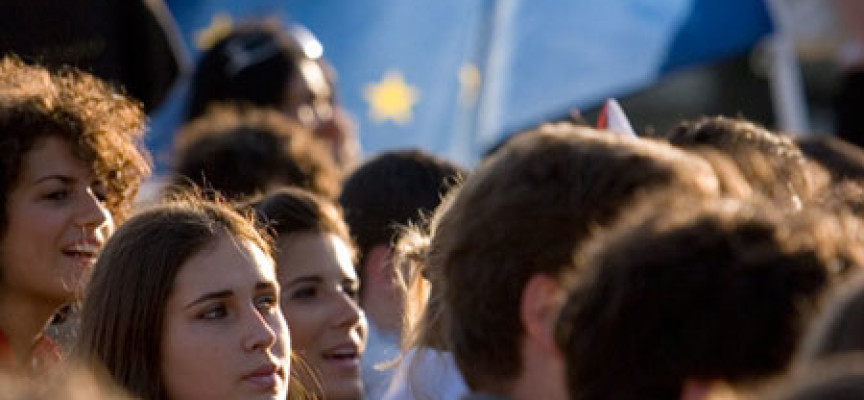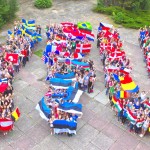Is interesting to notice that, while our political and institutional reality is not widely shared by the youngest bracket, the trust for U.E is becoming bigger and bigger.
This trust is being threatened ,but at the same time, renewed by the actual crisis, and about it we won’t talk any further.
Is necessary to restart from the bases. The bases are the young people, and the young people can be reassumed in just one word ,that is, future together with opportunity. Opportunity where?
In the job, in the school. The U.E is working hard to handle this even if it has its known problem: if the youth unemployment is the 41,6% in Italy, in Germany it doesn’t reach the 8% (November 2013). There have always been inequalities. The last European youth policies bring to the formation of the European youth Guarantee a new mechanism –rather ambitious- that should fix the youth unemployment, which reached the 5,7 million of young people in the Old Continent. So all the young people under the age of 25 must receive a job offer (of apprenticeship, tirocinium, any other kind of autonomous real job , or other formative phases) within the first four years from the end of their studies, or from the beginning of their inoccupation.
A project that will cost about 21 billion Euros a year, the 0,22% of the Pil, contrasting the 153 billion Euros spent in subsidies or lost in duties. Even for school the project is to reach a higher step and at the same time to bring everything at the same level, that is courses and degrees, so that the school will have a strong international side and finally travelling and moving will become easier. But good intentions are useless. Peter Matjašič ,Slovenian and President of the European Youth Forum, who opened the youth conference of UE last week in Salonicco, underlined how this period of crisis can have as a result a generation of lost young people. They deserve to be actually included by this context and to be an active part of the society, because we are changing our way of being citizens and we are also experiencing a new way of living, travelling, working, studying and first of all, thinking.
One thing is left: the fact that we ,as Europeans citizens, represent a dream for many people.
A dream that can do come true and concrete, but maybe we didn’t really realized its potential yet. A dream that, in the last months, we are reminded every day because there is a State which is fighting for the right to believe in it. A dream that a few hours ago the professor Myroslav Marynovych, vice director of the catholic Leopoldi University, remembered in his speech and asked to the EU: „ the young Ukrainian people fought for those same principles in which Europe was founded. What will be Europe’s answer for their immolation?“
The responsibilities for this project will be of all of those who are growing with it, but is necessary to increase its credibility with actions, because words aren’t enough.
Fa riflettere proprio come, mentre la nostra realtà politica ed istituzionale non sia largamente condivisa dalla fascia più fresca della popolazione, la fiducia nei confronti dell’Ue si faccia sentire. Una fiducia in parte compromessa, ma al tempo stesso rinnovata da quella crisi di cui è ripetitivo parlare. Per ricominciare, bisogna ripartire dalle basi. Le basi sono i giovani e i giovani possono riassumersi in una parola sola che è futuro, da accompagnarsi ad opportunità. Opportunità dove? Nel lavoro, e nella scuola. E su questi aspetti l’Ue prova a darci dentro, seppur con le solite pecche: se la disoccupazione giovanile in Italia è del 41,6%, in Germania non raggiunge neanche l’8% (dati novembre 2013). Le disuguaglianze ci sono sempre state. Le politiche giovanili targate Europa degli ultimi tempi hanno portato alla formazione della European Youth Guarantee, un nuovo meccanismo – piuttosto ambizioso – che dovrebbe arginare proprio la dicossucupazione giovanile, che è arrivata a toccare i 5,7 milioni di giovani nel Vecchio Continente. In base a questo, tutti i giovani europei sotto i 25 anni dovranno ricevere un’offerta di lavoro (che sia di apprendistato, tirocinio, un vero impiego autonomo o qualche altra fase formativa) entro quattro mesi dalla fine degli studi o dall’inizio della disoccupazione. Un progetto che costerà circa 21 miliardi di euro all’anno, lo 0,22% del Pil, contro i 153 miliardi di euro (1,21% del Pil) spesi in sussidi o persi in mancate imposte. Anche per quanto riguarda la scuola, l’idea è quella di alzare il livello e al tempo stesso livellare percorsi e gradi, in modo da creare un mondo scolastico in cui la componente internazionale sia forte, e in cui spostarsi sia semplice. Ma i buoni propositi servono a poco. Peter Matjašič, sloveno e presidente del Forum della Gioventù Europea, ha aperto la conferenza giovanile dell’UE della scorsa settimana a Salonicco evidenziando come da questo contesto di crisi possa emergere una generazione di giovani perduta. I giovani meritano di essere realmente inclusi e di avere un impatto reale sulla loro società, perché si sta innestando nel nostro modo di essere cittadini anche un modo nuovo di vivere, viaggiare, lavorare, studiare e, soprattutto, pensare.
Resta una cosa certa: che, per molti, noi cittadini europei rappresentiamo un sogno.
Un sogno che può diventare reale e concreto, ma della cui potenzialità forse non ci si è resi ancora sufficientemente conto. Un sogno che negli ultimi mesi ci viene ricordato ogni giorno, perchè c’è uno Stato che sta lottando per avere il diritto di credere in esso e sul quale proprio poche ore fa il professor Myroslav Marynovych, vicerettore dell’Università cattolica di Leopoli, ha posto un quesito all’Ue: «I giovani ucraini si sono battuti per quegli stessi principi sui quali l’Europa è stata fondata. Quale sarà la risposta dell’Europa al loro martirio?».
La responsabilità di un progetto toccherà un giorno a chi sta crescendo con esso, è necessario aumentare la credibilità con i fatti, perché le parole, arrivati a un certo punto, non bastano più.
Те кто верит в EC
Маастрихтский договор 1992 года, но он вступил в силу в ноябре 93.
Автор этой статьи практически родился с Европейским Союзом. Мы являемся первым поколением которое подписалo ЕС. Именно поэтому наш способ чувствуя себя европейцами отличается от тех, кто пришел раньше, и от тех кто придет после. Европейский союз это нашa новинка. Это новинка в которую в Италии верят более 66% в возрасте до 24: учитывая
эти даты, чтобы стать обнадеживающим должнo быть еще увеличена.
Именно,рассуждая, в то время как наша политическая и институциональная реальность не широко распространеннa для молодого поколения , но в тоже время присутствует доверие к Евросоюзу.
Доверие частично скомпрометированo, но в то же время, вновь в результате кризиса обновлено и повторяется обсуждению. Для начала, мы должны начать с самых основ.
Основы- являются молодые, молодые люди могут быть выражены одним словом – будущее,
и должны сопровождаться возможностью. Где существуют возможности? На работе, и в школе.
И по этим вопросам, ЕС пытаeтся работать над этим хотя и с некоторыми недостатками:
Уровень безработицы среди молодежи в Италии 41,6%, в Германии не достигает даже до 1,8 (ноябрь 2013 данные). Неравенство были всегда. Молодежная политика под маркой-
Европа в последнее время привели к образованию European Youth Guarantee,-новый механизм – достаточно амбициозный- который должен уменьшить свой безработицy среди молодежи, этот механизм используется чтобы прикоснуться к 5,7 млн. молодых людей в Старом Свете. Исходя из этого, все молодые европейцы в возрасте до 25 лет должны получить предложения о работе. что ученичество, (это может быть как обучение, практика, истинной автономной самозанятости или какой-либо другой формирующий этап), в течение четырех месяцев после завершения учебы или в случае безработицы. Это проект, который будет стоить около 21 млрд.евро в год, или 0,22% от ВВП, против 153 млрд.евро (1,21% ВВП) потраченные на субсидии или потеряли в недостающих налогах. Также что касается школы, идея повысить уровень и в то же время выравнивания степени, для того, чтобы создать школьный мир, который является сильным международный компонентoм. Но только благие намерения приносят мало пользы. Peter Matjašič, из Словении, президент Европейского молодежного форума, открыл конференцию молодежи ЕС на прошлой неделе в Салониках подчеркивая, как это контекст кризиса может поднять потерянное поколение молодых людей. Молодые люди действительно заслуживают того, чтобы могли быть включены и иметь реальное влияние на их общества, потому что фиксируя в нашем образе являются гражданами нового образа жизни: путешествовать, работать учиться, а главное уметь думать.
Одно точно ясно: что для многих, мы европейцы являемся как мечта.
Мечта которая может стать конкретной, реальностью, но потенциал
возможно недостаточно отдает себе отчет. Мечта, которая в последние месяцы мы вспоминаем каждый день, так как есть государство, которое изо всех сил пытается иметь право верить в него и всего несколько часов назад, профессор Мирослав Маринович, вице-ректор Католического университета Львова, задал вопрос к ЕС: “Молодые украинцы боролись за те самые принципы, на которых основана Европа. Каким будет ответ Европы на их мученичества? ”
Oднажды, oтветственность проекта коснется тех кто растет вместе с ним, нужно повысить доверие c фактами, потому что слов больше не достаточно.
Nathascia Severgnini
Twitter: @GGiornalisti
Latest posts by Nathascia Severgnini (see all)
- Those who believe in it - 25 marzo 2014











